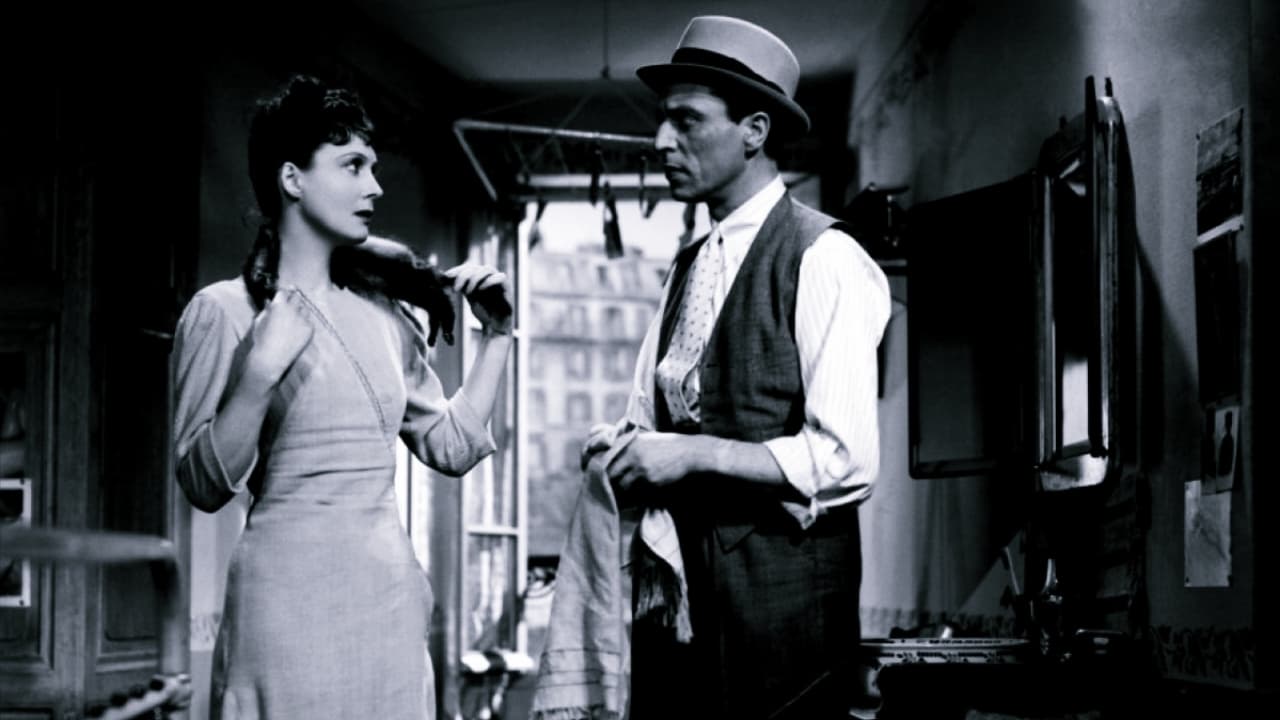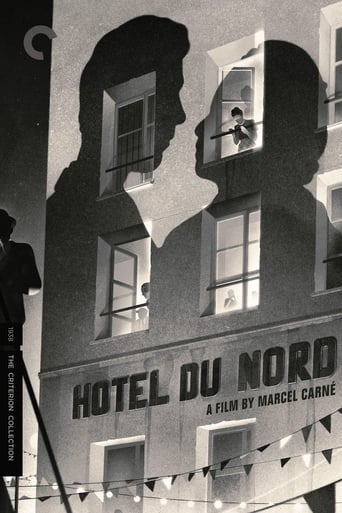



Although it has its amusing moments, in eneral the plot does not convince.
View MoreI wanted to like it more than I actually did... But much of the humor totally escaped me and I walked out only mildly impressed.
View MoreGood films always raise compelling questions, whether the format is fiction or documentary fact.
View MoreThe film's masterful storytelling did its job. The message was clear. No need to overdo.
View MoreOver the banks of Canal St Martin in Paris, there is "Hotel du Nord", a creation of novelist Eugene Dabit, dialogist Henri Jeanson and director Marcel Carne, a purgatory for the past sins, a lost station where people can relieve themselves from the burden of the pasts, as the weight of luggage thrown on the bed. There's something oddly definite in a hotel room, everyone stays, but some just don't want to be reminded they'll have to go, sooner or later.The film opens with people celebrating a communion and the atmosphere (beware, this is a word you'll often find in this review) is cheerful with people joking about cops and religion. There is the local lock keeper who takes some pride from regularly giving his blood while he should be more suspicious about the kind of services his very wife provides, she seems to be too much of a good public for the local womanizer but Bertrand Blier in his earlier years of good-natured cuckolds' roles, fails to see it. There is an adopted Spanish kid goes to his mother's arm because the thunder reminds me of the Civil War's bombing, What this dinner with its gallery of colorful characters shows is that, in the interwar period, people took life as it came, at times enjoyed it but some didn't find reasons to find enjoyment, and the past had a lot to do with it.The film centers on two couples, starting with Raymonde (Arletty) and Monsieur Edmond (Louis Jouvet) who're not "at the party", which literally in French, means that they're far from this universe and don't care about it. In all fairness, Raymonde seems to care about people, she is enthusiastic and welcomes the little girl who brought her a piece of cake, her companion, the grouchy Edmond asks why he doesn't have one. We suspect he couldn't care less and only needed a reason to complain, he's a man who won't let one smile slip from his face, maybe because life plays like a succession of thunders reminding of previous bombings. He eats, he drinks, smokes, practices his hobby which is photography, but inside, he's dead. Raymonde lives and smiles for two, she join the guests and lets her man alone. We'll find out later that they had a past that partly explains their opposite natures.The other couple is Renee and Pierre (Annabella and Jean-Pierre Aumont), they're young and good-looking and they're ready to commit suicide, they just lost it, they don't trust the world anymore and 'Hotel du Nord' was the edge of their lives, like "Romeo and Juliet", they're dying together. Their dialogues are sentimental and almost too theatrical, contrasting with the lively slang of Arletty and Jouvet and the film takes a weird dark melodramatic turn until we hear a 'bang'. When Edmond gets in the room, he finds Renée lying in the bed and her lover who didn't have the guts to pull the trigger for him; Edmond lets him go and calls the Police. Renee survives but in her act of death, she gave Edmond a reason to live. There's no shortage of ironies in 'Hotel du Nord' and this one is the most poignant.Edmond find someone unhappier than him and realizes very soon that he can't stand Raymonde. This leads to the iconic moment of the film, one that might be lost in translation, but that can't be ignored due to its resonance in the history of French cinema. Edmond planned to travel with Raymonde then he gave up; realizing that the problem isn't in the destination but the company. He's suffocating with Raymonde, he needs to change his atmosphere, which she is. Now, can you even describe an appeal that all lies in the thick Parisian accent of Arletty who finally has her rebellious moment, tired of her companion's tantrum and shouting "Atmosphere? Atmosphere! do I look like an atmosphere?" This is a line that has the same resonance as the 'Waterfront' contender speech or 'You talking' to me?' It came to the point that people would see the film because of this line they generally heard of before even seeing the film.Does the line capture the spirit of 'Hotel du Nord'? Yes and no. No, because it wasn't meant to, the word doesn't carry any particular meaning, it just transcended itself in the mouth of Arletty, proving that cinema works in mysterious ways, any quote can become legendary just because it has the right accent, intonation and actor to deliver it. And yes, because this is a key word when you think about it, it's all about the atmosphere where we can find life more livable. The film opens with many couples, some stay the same, some break up and get back together, some live, some try to travel but then realize they have more to lose in leaving and some are tied to other people and can't do any move without them.Arletty and Jouvet are the two driving forces, the yin and the yang, the woman whose heart is like a window opening to welcome the glow of the morning and the man who lives in perpetual nighttime and realizes that there might not be an atmosphere for him. And through "Hotel du Nord", Marcel Carné proved his importance on the field of French cinema, after "Quai des Brumes" which featured Gabin as a deserter, he went for a less controversial subject, and made film about little people who wonder in the same place and try to find a meaning in their lives, without making their quest too existential, some are stuck to the past, some pray for a brighter future, and some live in the present. The following year, present, past and future will all make one: war.So like a seeming calm before the" premonitory storm, 'Hotel du Nord' is like a fascinating conjunction of three visions of life, or let's say three atmospheres.
View MoreIn a hotel in Paris two lovers agree to take their own lives, the woman is romanticizing the suicide in a degree she must represent the escapism of many not so well-off in prewar Paris. The hotel is in itself a meeting place for the people of the district. Pierre shoots Renee, but is disturbed by Edmond so he flees the scene.The story in itself is not so extraordinary today, but nothing takes away from its impact still. It has no problem of holding your attention to the very end. Its my first meet with any involved in 'Hotel du Nord'. Louis Jouvet is very good in his joy and meaningless role that finds meaning for just a little while. So is Arletty.
View MoreI love this movie, Jouvet, Arletty, Blier, Carné... almost everything has already been said about the movie, but there is one detail I'd like to shed some light onto: no footage of the real, still standing, Hôtel du Nord (is it still? I heard it was to be demolished...) has been used for the movie - the whole scene has been rebuilt on set, the main reason being that they could not stop the traffic on the St Martin canal for several weeks.
View MoreI've just checked out the previous comments for this movie; it is interesting to note that 1) they are all favorable, 2) they all date from 1999 onwards and 3) they range from a simple recording of a joyous experience to the quasi-academic/analytical. This tells us clearly that even a film made 65 years ago can still speak to us today and bring pleasure on the one hand whilst inspiring in-depth analysis on the other. I am only saddened that not one commenter deigned to give a nod to Jean Aurenche, the great screenwriter (though one correspondent, did acknowledge Aurenche's co-writer Henri Jeanson who helped adapt the Eugene Dabit novel). In his 80-odd years Aurenche wrote more than 70 movies, just under half with Pierre Bost, and arguably his best known script outside France was 'Jeux Interdits' in 1952, though he also wrote 'Paris brute-t-il?' (Is Paris Burning?) an international production, and toward the end of his career, wrote for Tavernier - 'L'horlager de St. Paul', 'Coup de Torchon' - and his stories about working during the occupation inspired Tavernier to immortalize him in 'Laissez-Passer'. But I digress: French actors have always had a penchant for single names - Raimu, Bourvil, Coluche, Fernandel, etc - and in Hotel du Nord we have no less than three of them, Andrex, Annabel and Arletty. The first two fell by the wayside - unless you want to count the toilet tissue made famous in England by TV commercials featuring puppies - but Arletty remains one of the all-time greats and even rumors of collaboration have failed to dim her memory. Here she is at her best which was just as well as she was up against Louis Jouvet, another giant of the French stage and screen. The film is drenched in atmosphere which is echoed, whether intentionally or not, in Arletty's great line, which our French commenter rightly says is the most famous in French cinema and which he/she translates well as 'atmosphere, does this face look like atmosphere (is it that this face). Though he was no Jacques Prevert (but then, who is?) Aurenche had undoubtedly absorbed the poetic realism invented by Prevert and brought it to bear on this, only his sixth screenplay. Though at a basic level it is just another melodrama that ends in tears there are metaphors and symbols a plenty if, as our Dublin commenter, you care to look for them. The small, enclosed and private world just behind Gare de l'est, the 'trouble in paradise' motif that is introduced as soon as the idyllic opening sequence of 'one big happy family' has been established, the threat from outside - at a basic level the hoods who have come to find Mr Edmond, at another the Nazi thugs waiting in the wings - etc. Read it how you will it remains a great film. Apart from Aurenche none of the other commenters mentioned Bernard Blier, also at the beginning of a long and distinguished career, to say nothing of siring director Bertrand Blier - the commenter who was so struck with Louis Jouvet may care to know that Blier played opposite Jouvet some nine years later in Clouzot's 'Quai des Orfevres'. The Hotel du Nord is still standing but is now (or was when I last visited), owned by Greeks who haven't a clue about its place in history despite the smattering of lobby cards, affiches, etc in the bar and it is now a venue for English comics. The canal St. Martin is itself undergoing major changes, presumably not for the better but as for Carne's movie and Sandy Traunaur's sets, both were Canal Plus long before there was a TV channel (now technically defunct) and will remain so long after Canal + is just a co-producer credit on sub-Carne movies.
View More